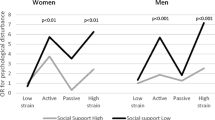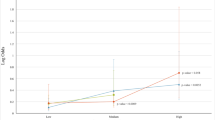Abstract
This study tested whether quantity and quality of social support and two sources of work stress (organizational stressors and job risk) predicted work strain in police officers, a high-risk occupational group. The participants were 135 police officers from a large metropolitan law enforcement agency who responded to questionnaires for assessing work stress, social support, exhaustion, and other strain symptoms. Emotional support and work stressors accounted directly for significant variance in emotional exhaustion, depersonalization, and symptom frequency. Conflicted relationships, which are a source of both work stress and support, also contributed to strain. In contrast to previous findings, a reverse buffering effect for social support did not contribute to predicting strain. Stress management programs for police and other high-stress occupations should target increasing emotional support from supervisors and peers, and reducing conflict in job and family relationships.
Similar content being viewed by others
References
Ashford, S. J. (1988). Individual strategies for coping with stress during organizational transitions.Journal of Applied Behavioral Science, 24, 19–36.
Barone, D. F. (1991). Developing a transactional psychology of work stress. In P. L. Perrewe (Ed.), Handbook on job stress.Journal of Social Behavior and Personality, 6 (Special issue). 31–38.
Barone, D. F., Caddy G. R., Katell, A. D., Roselione, F. B., & Hamilton, R. A. (1988). The Work Stress Inventory: Organizational stress and job risk.Educational and Psychological Measurement, 48, 141–154.
Barone, D. F., Katell, A. D., & Caddy, G. R. (1991). The Work Stress Inventory. InTests in microfiche (Set P, #016638). Princeton, NJ: Educational Testing Service.
Baxter, D. (1978). Coping with police stress.Trooper, 3, 68–73.
Beehr, T. A. (1985). The role of social support in coping with organizational stress. In T. A. Beehr & R. S. Bhagat (Eds.),Human stress and cognition in organizations (pp. 375–398), New York: Wiley.
Beutler, L. E., Nussbaum, P. D., & Meredith, K. E. (1988). Changing personality patterns of police officers.Professional Psychology: Research and Practice, 19, 503–507.
Blackmore, J. (1978). Are police allowed to have problems of their own?Police Magazine, 1, 47–55.
Burke, R. J., Shearer, J., & Deszca, G. (1984). Burnout among men and women in police work: An examination of the Cherniss model.Journal of Health and Human Resources Administration, 7, 162–188.
Cohen, S., & Wills, T. A. (1985). Stress, social support and the buffering hypothesis.Psychological Bulletin, 98, 310–357.
Derogatis, L. R. (1983).SCL-90-R: Administration, scoring and procedures Manual-II. Towson, MD: Clinical Psychometric Research.
Graf, F. A. (1986). The relationship between social support and occupational stress among police officers.Journal of Police Science and Administration, 14, 178–186.
Heiman, M. F. (1975). Police suicide.Journal of Police Science and Administration, 3, 267–273.
Hobfoll, S. E. (1988).The ecology of stress. New York: Hemisphere.
House, J. S. (1981).Work stress and social support. Reading, MA: Addison-Wesley.
Jacobi, J. H. (1975). Reducing police stress. In W. H. Kroes & J. J. Hurrell (Eds.),Job stress and the police officer: Identifying stress reduction techniques (HEW Publication No. NIOSH 76-187, pp. 85–116). Washington, D. C.: U.S. Government Printing Office.
Kanner, A. D., Coyne, J. C., Schaefer, C., & Lazarus, R. S. (1981). Comparison of two modes of stress measurement: Daily hassles and uplifts versus major life events.Journal of Behavioral Medicine, 4, 1–39.
Kaufman, G. M., & Beehr, T. A. (1986). Interactions between job stressors and social support: Some counterintuitive results.Journal of Applied Psychology, 71, 522–526.
Kaufman, G. M., & Beehr, T. A. (1989). Occupational stressors, individual strains, and social support among police officers.Human Relations, 42, 185–197.
Kobasa, S. C. O., & Puccetti, M. C. (1983). Personality and social resources in stress resistance.Journal of Personality and Social Psychology, 45, 839–850.
Kroes, W. H., Margolis, B., & Hurrell, J. J. (1974). Job stress in policemen.Journal of Police Science and Administration, 2, 386–387.
Lazarus, R. S. (1991). Psychological stress in the workplace. In P. L. Perrewe (Ed.), Handbook on job stress.Journal of Social Behavior and Personality, 6 (Special issue), 1–13.
Linden, W., Paulhus, D. L., & Dobson, K. S. (1986). Effects of response styles on the report of psychological and somatic distress.Journal of Consulting and Clinical Psychology, 54, 309–313.
Martelli, T. A., Waters, I. K., & Martelli, J. (1989). The police stress survey: Reliability and relation to job satisfaction and organizational commitment.Psychological Reports, 64, 267–273.
Maslach, C., & Jackson, S. E. (1981).Maslach Burnout Inventory Manual (Research ed.). Palo Alto, CA: Consulting Psychologists Press.
Paulhus, D. L. (1984). Two-component models of socially desirable responding.Journal of Personality and Social Psychology, 46, 598–609.
Pearlin, L. I., Lieberman, M. A., Menaghan, E. G., & Mullan, J. T. (1981). The stress process.Journal of Health and Social Behavior, 22, 337–356.
Roberts, M. D. (1975). Job stress in law enforcement: A treatment and prevention program. In W. H. Kroes & J. J. Hurrell (Eds.),Job stress and the police officer: Identifying stress reduction techniques (HEW Publication No. NIOSH 76-187, pp. 226–233). Washington, D. C.: U. S. Government Printing Office.
Sarason, I. G., Levine, H. M., Basham, R. B., & Sarason, B. R. (1983). Assessing social support: The Social Support Questionnaire.Journal of Personality and Social Psychology, 44, 127–139.
Sarason, I. G., Sarason, B. R., Shearin, E. N., & Pierce, G. R. (1987). A brief measure of social support: Practical and theoretical implications.Journal of Social and Personal Relationships, 4, 497–510.
Singleton, G. W., & Teahan, J. (1978). Effects of job-related stress on the physical and psychological adjustment of police officers.Journal of Police Science and Administration, 6, 355–361.
Solomon, Z., Mikulincer, M., & Hobfoll, S. E. (1986). Effects of social support and battle intensity on loneliness and breakdown during combat.Journal of Personality and Social Psychology, 51, 1269–1276.
Spielberger, C. D., Westberry, L. G., Grier, K. S., & Greenfield, G. (1981).The Police Stress Survey: Sources of stress in law enforcement (Monograph Series Three: No. 6), Tampa: University of South Florida, Human Resources Institute.
Strom, J., & Barone, D. F. (1993). Self-deception, self-esteem, and control over drinking at different stages of alcoholism.Journal of Drug Issues, 23, 705–714.
Terry, W. C. (1981). Police stress: The empirical evidence.Journal of Police Science and Administration, 9, 61–75.
Author information
Authors and Affiliations
Rights and permissions
About this article
Cite this article
Simons, Y., Barone, D.F. The relationship of work stressors and emotional support to strain in police officers. Int J Stress Manage 1, 223–234 (1994). https://doi.org/10.1007/BF01857989
Issue Date:
DOI: https://doi.org/10.1007/BF01857989




